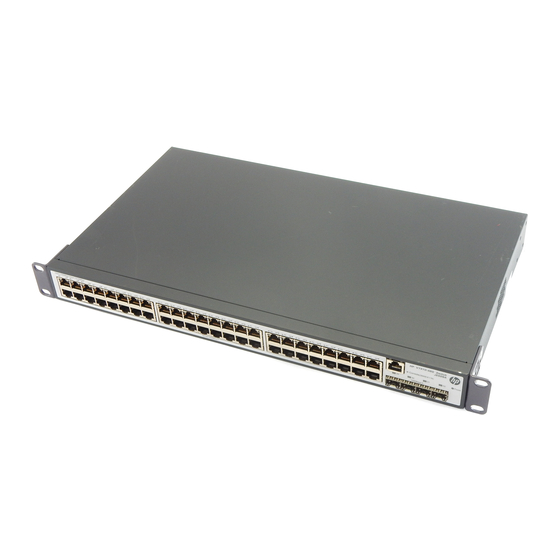- ページ 9
スイッチ HP 1910-8-PoE+のPDF スタートマニュアルをオンラインで閲覧またはダウンロードできます。HP 1910-8-PoE+ 26 ページ。 1910 switch series
HP 1910-8-PoE+ にも: クイックスペック (43 ページ), データシート (16 ページ), クイックスペック (44 ページ)

Lasting low relative humidity can cause washer contraction and ESD and bring problems including
•
loose captive screws and circuit failure.
High temperature can accelerate the aging of insulation materials and significantly lower the
•
reliability and lifespan of the switch.
For the temperature and humidity requirements of different switch models, see
specifications.
Cleanness
Dust buildup on the chassis may result in electrostatic adsorption, which causes poor contact of metal
components and contact points, especially when indoor relative humidity is low. In the worst case,
electrostatic adsorption can cause communication failure.
Table 2 Dust concentration limit in the equipment room
Substance
Dust
NOTE:
Dust diameter ≥ 5 μm
The equipment room must also meet strict limits on salts, acids, and sulfides to eliminate corrosion and
premature aging of components, as shown in
Table 3 Harmful gas limits in the equipment room
Gas
SO
2
H
S
2
NH
3
Cl
2
EMI
All electromagnetic interference (EMI) sources, from outside or inside of the switch and application
system, adversely affect the switch in a conduction pattern of capacitance coupling, inductance coupling,
electromagnetic wave radiation, or common impedance (including the grounding system) coupling. To
prevent EMI, take the following actions:
If AC power is used, use a single-phase three-wire power receptacle with protection earth (PE) to
•
filter interference from the power grid.
Keep the switch far away from radio transmitting stations, radar stations, and high-frequency
•
devices.
Use electromagnetic shielding, for example, shielded interface cables, when necessary.
•
Route interface cables only indoors to prevent signal ports from getting damaged by overvoltage or
•
overcurrent caused by lightning strikes.
Concentration limit (particles/m³)
≤ 3 x 10
4
(no visible dust on the tabletop over three days)
Table
3.
Maximum concentration (mg/m
0.2
0.006
0.05
0.01
2
"Appendix B Technical
)
3
